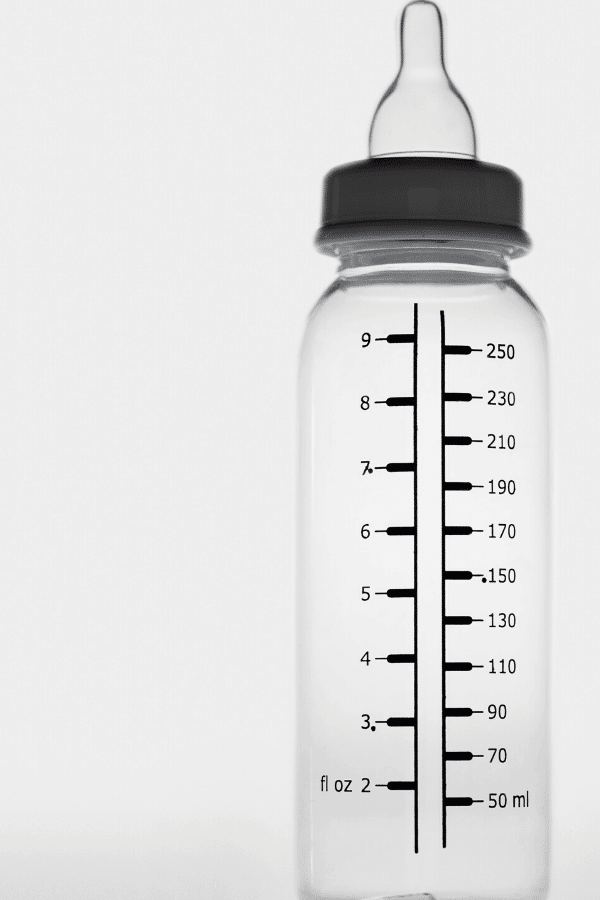Your baby will experience gas, that’s a given.
This is due to your baby’s digestive system being immature when they’re born.
It can be frustrating for both your baby and yourself, as not only comes with an upset stomach but also it could lead to a lot of… unpleasant smells.
All 5 of my babies experienced gas at least once when they were little.
It’s completely normal and they will eventually grow out of it when their digestive symptoms mature, so don’t worry, it won’t be a long-lasting issue.
It Won’t Last Forever
When I had my first baby, I was at a loss when they had gas. I felt helpless and I heard them cry and scream in pain.
As a first-time mom, I can tell you the truth; I had no idea about gassy babies!
Luckily for me, there were a few remedies to try which fortunately worked for me (and my little one)
RELATED: HOW TO BURP A BABY THAT IS HARD TO BURP

How To Tell If Your Baby Has Gas
Wouldn’t it be so much easier if your baby was able to tell you where it hurts? I wish!
Instead, you’ll try to figure it out for hours, and maybe once you have an idea about what it might be, they’ve probably stopped and are fast asleep.
You’ve thought of everything: nap time, maybe they’re hungry? needs a diaper change?
If you’ve exhausted every other option, then it’s probably gas causing their high-pitched cries.

Does Your Baby Pull Up Their Legs To Their Chest and Is Really Fussy?
Then its probably gas
You can try the tips listed below to see if you can calm them.
RELATED: Easy Hacks And Natural Remedies To Soothe A Crying Baby
Does Your Diet Affect Your Baby’s Gas?
Everyone will tell you to have a look at your diet if you mention that your little one is suffering from uncomfortable gas.
People might even start listing the foods that you should eliminate from your diet.
Although, there seems to be no correlation to a breastfeeding mom’s diet and a baby who suffers gas pain.
RELATED: Want To Know Why Your Baby Is Shaking Their Head? Read This
Causes Of Gas In Babies
It might not even cross your mind, but babies spend the majority of their day sucking in air.
Whether it be from sucking on a pacifier, crying, or drinking from a bottle.
This means that they might be taking in too much air. Hence, ultimately it will cause a very gassy baby.

Breastfed Babies And Gas
Making sure your baby has the correct latch is vital.
In fact, a shallow latch can cause excess air to enter your babies’ stomach, which will certainly lead to a gassy baby.
Likewise, if you keep your baby’s head at a 45-degree angle, just above their stomach while you feed them, can also cause an excess of air entering their stomachs.
Positioning a pillow under your arm to help support the baby’s neck instead of using a breastfeeding support pillow can make a lot of difference and help avoid your baby’s gas issues.
Ensure to burp your baby a couple of times when you change from one breast to another during feedings.
You may hear over and over that breastfed babies don’t need to be burped.
In my personal experience, having breastfed 5 babies I felt they needed to be burped as equally as bottle-fed babies.
RELATED: How to bottle feed a breastfed baby
Breastfed Babies Need To Be Burped
Keep your baby upright for at least 10 minutes after a feeding session to add an extra safety measure.
Bottle-Fed Babies And Gas

If you’ve decided to bottle-feed your baby, then you might notice they experience more gas than breast-fed babies.
I bottle-fed my breastfed babies regularly expressed milk and they definitely struggled with gas more than when they were being exclusively breastfed from the breast.
Remember that even if they do suffer from gas, this will change as their digestive system develops.
First of all, try not to over shake the formula as you’re mixing it with water.
The more shaking you do; the more air bubbles are created into the formula.
Air bubbles and babies digestion are not a good combo.
It’s simple to minimize these issues by just not shaking the bottle as much and letting it sit before serving it to your little one.
Do not let your baby suck on the bottle when it’s empty.
Keep your baby’s head elevated and the bottle at a 45-degree angle while feeding, and make sure that their mouth is on the wide base of the bottle nipple.
If the gas is severe, hold your baby upright for 30-45 minutes after feeding and you might want to fill the entire nipple with the milk so they aren’t taking in any unnecessary air.
If you have a particularly gassy baby, then feeding them more often but smaller quantities might be a good thing to try.
There are many great bottles on the market to help with gas in a baby.
YOU MAY ALSO LIKE : The Best Words of Encouragement for Mothers

This Are The Ones That Worked Best For Me And My Baby:
You might have even tried all of these remedies and found that nothing seems to work. If that’s your situation then consider changing to a different formula.
Here are some of the most popular formulas available:
Simulac Sensitive – works well for reducing gas
Simulac Soy Isomil – if you’re baby is sensitive to milk protein
Enfamil Gentlease – formulated to reduce gas
Related: Best Baby bottles for reflux 2020
Natural gas relief for babies
If you’re not having any luck from these remedies, then it’s time to try something natural to stem the excess gas in your baby.
Warm Bath
Giving your baby a warm bath will help to move some of the air out. This will help to relax your babies’ muscles and move the gas out naturally.
If you warm the room beforehand, this will ensure that your baby is completely relaxed.
Be mindful that a relaxed baby in the bath can lead to bowel movement.
I’ve made that mistake before.
I’ve given my babies a warm bath without taking this into consideration. Let me just say if this happens to you; you’ll need an emergency plan.
Baby Massage
Probably one of the best home remedies, proven time and time again by every mom out there.
It would be ideal to give your baby a massage several times a day due to the fact that baby gas tends to get gradually worse throughout the day.

Here’s the best way to massage your baby:
1. Put oil or lotion on your hands and rub it in slightly so it isn’t so cold on your baby’s body. Then move your hands in a clockwise direction around your baby’s tummy.
2. Take both of your hands and move them down the abdomen.
3. There is such a thing as the ‘I love you’ technique where you should start on the baby’s left-hand side and make an ‘I’ movement downwards.
Moving to the right-hand side of the belly, do an upside-down ‘L’ and ‘U’ starting at the bottom right-hand corner.
Both thumbs should then be placed at the naval and you should massage out to the sides of the tummy.
4. You should do each move several times.
5. Baby should always be massaged in a clockwise direction to encourage the movement of the intestines.
6. Not only does this work on gassy babies, but also if they are suffering from constipation.
Bicycle Kicks
It is also best to perform these multiple times a day if your little one is really struggling with gas pains.
Your baby should be placed on their back and you should begin to move their legs as if they were riding a bicycle. Don’t force your baby’s legs, just be gentle.
To finish up, take both legs and lift them up towards their belly button.
Try the colic/gas hold
To force the trapped air out, putting slight pressure on your baby’s abdomen while you carry them can work.
Just place your baby’s head in the palm of your hand and rest their stomach on your forearm.
It used to really calm my baby down and help with getting any trapped gas out.

Tummy Time
I do know that some babies hate tummy time.
My second child despised it, and so this method just wasn’t effective for him.
But, if your baby is fond of tummy time and everything else fails, try this to help force the air bubbles out.
I would definitely recommend incorporating tummy time into your baby’s routine. It can help with wind, prompt them to keep their head up and prevent flat head syndrome.
Over the counter remedies
Gas drops
These are probably the most common over the counter remedies for trapped wind. They contain simethicone which is an antifoaming agent that can make it easier for your little ones to pass wind.
Gas drops are completely safe but just consult your pediatrician beforehand. Just in case.
Gripe water
I was gifted gripe water at my first baby shower and to be honest when I opened it, I had to do the fake smile and unappreciative ‘Aw, thank you’
Honestly, I genuinely didn’t know why someone would gift this to a new mom.
Although, I came to find out that this bottle of liquid, is a miracle worker and helped me in real times of need.

What is Gripe water and how does it work?
It is full of natural ingredients and in most brands, you’ll find a combination of water and sodium bicarbonate. It works naturally to soothe your baby’s gassy tummy.
So, if your baby seems really uncomfortable, then it is worth a shot.
Try Gripe Water, You’ll Thank Me
It is recommended to give this to your baby after they’re 4 weeks old due to the immaturity of your baby’s digestive system, although I would speak to your pediatrician.
Even with all of these things, it can be a constant battle to deal with gas due to the cries of pain your baby will be going through and the helplessness you’ll begin to feel.
Although, at least one of these methods should work which will definitely put your mind at rest.
